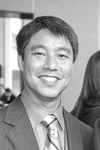
David Inoue
In the past few weeks, the one word, actually an abbreviation, that holds immense power over so many Japanese Americans reared its ugly head in at least two high-profile situations.
Whether heard as a child or an adult, the “J” word often elicits a sharp emotional reaction. I recall the first time I remember hearing the word as a child of around 6 years old, spoken by older kids on the street in suburban Chicago. And, of course, it was often heard in tandem with the “C” word, which ironically, for my mixed background, was appropriately inappropriate for me as well.
First, at the end of October, a play opened in Berkeley titled “The Jap Box.” The producer, writer and lone actor in the play is David Hirata, himself a Japanese American whose family was incarcerated at Tule Lake.
News of the play’s title spread like wildfire through the Internet, prompting me to reach out to Hirata. Within a few days, we spoke on the phone for nearly an hour. I was not the first, nor the last person, who had reached out. I shared my own personal experience with the word,and what I had heard from others. Already, at that point, he was considering a name change.
At this point, JACL’s Berkeley chapter had also met and discussed the play at its board meeting earlier in the week. Tiffany Ikeda, chapter co-president, planned to attend the Friday performance with Nancy Ukai and Karen Kiyo Lowhurst.
The three of them met with Hirata for an hour following the performance, again expressing the deeply felt personal perspectives on the title. The chapter followed up with a powerful letter to Hirata and the theater.
At that point though, the decision had been made, and the new name of the play would be “A Box Without a Bottom: Soko-nashi Bako.” In reality, it was not a name change, but rather the truthful name for the magic prop, before it had been appropriated by white magicians and given its racist name.
This new name is a celebration of the rightful origins of the magic trick that is central to the performance and Mr. Hirata’s story as a magician. The name change was followed with a heartfelt and sincere apology for the use of the offensive racist slur in the original name of the play. If only all apologies could be as truthful and sincere as Mr. Hirata’s.
Even as this situation was concluding, I received a call from someone else in Washington, D.C., notifying me of a local construction company named JAP Builders.
I looked into the company’s website and sent a message to the generic email on the site.
Within two days, I heard back from the owner — again, with a truly sincere apology and assurance that they were looking into remedies for the name. The company had been named for the owner’s initials. An immigrant, he was not familiar with the racist legacy of the word in this country. It will take some time to make changes, but the owner promised changes would be made.
In both of these cases, there was no ill intent, but the similarity was the ignorance to the past and present power of a racist slur. In both cases, with appropriate education and outreach, the result was a swift apology and promises to make things right. It underscores the importance of ongoing education. It is not just the legacy of this one word, but the way it has been used to dehumanize and diminish.
Today, we see a trend to normalize some of these words that have been used to oppress. The “N” word is used in some cases by African-Americans to claim control of the word and mute its power.
We must all be clear that this narrow usage of the word does not give license to anyone to use the word, though some have tried.
The NFL continues to allow the football team in our nation’s capital to use a slur for Native Americans as its name, despite the objections of many Native American and allied groups, including JACL.
We must be steadfast in our opposition to the use of slurs. What is most important to JACL as a civil rights group is our strong reliance on our history to speak out on problems today.
These are not isolated incidents, as we have seen with the incident at our own convention in 2018 and the Kansas license plate. It is only when people forget that we begin to once again repeat the wrongs of the past. This is one wrong we cannot allow to be repeated.
David Inoue is executive director of the JACL. He is based in the organization’s Washington, D.C., office.



